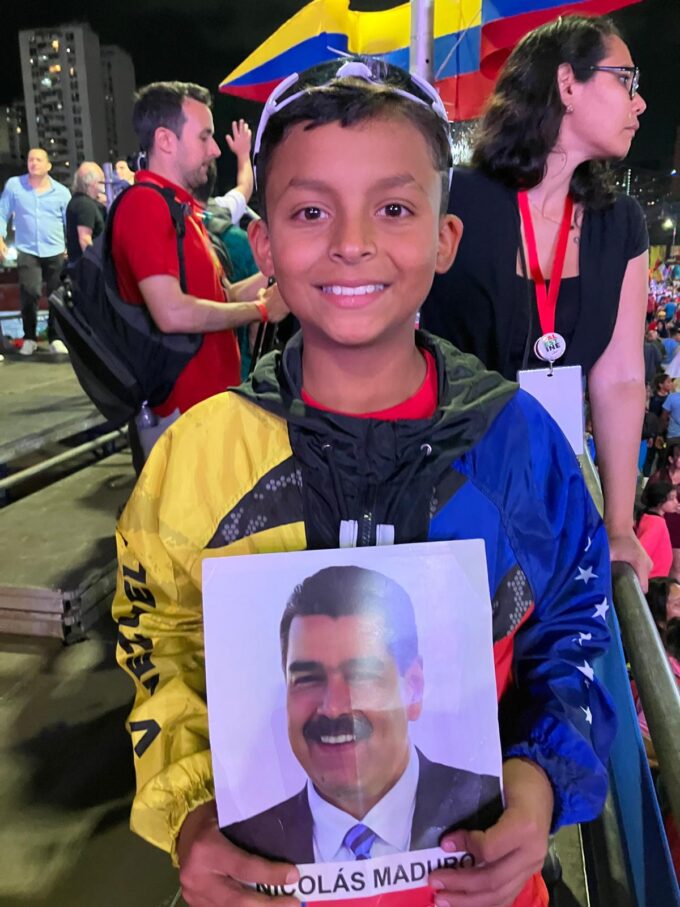

Photo: Roger Harris.
July 29, 2024, Caracas, Venezuela.
Shortly before midnight, the president of the National Electoral Council (CNE), Elvis Amoroso, announced the re-election of Venezuela’s President Nicolas Maduro. Like the proverbial boy who cried wolf, the US-backed and funded far-right opposition cried fraud.
Maduro won with 51.2% of the vote. His nearest rival, the far-right US-backed candidate Edmundo Gonzalez trailed by 7 percentage points.
While the US corporate press refers to the “opposition” as if it were a unified bloc, eight other names appeared on the ballot. Unlike the US, where most of the electorate is polarized around two major parties, the fractious opposition in Venezuela is split into many mutually hostile camps whose dislike of the ruling Socialist Party is matched by their loathing for each other. And this is despite millions of US tax-payer dollars used to try to unify a cabal that would carry Washington’s water.
Sore losers
In the quarter century since Hugo Chavez initiated the Bolivarian Revolution when he was elected president in 1998, the Chavistas have won all but two of over thirty national contests. The far-right opposition celebrated when they won a national referendum along with the 2015 National Assembly contest. But every other time, the sore losers cried fraud.
Yet every one of these contests employed the same electoral system of multiple public audits, transparent counting, and an electronic vote backed with paper ballots. The system is incontrovertibly fraud-proof. Former US President Jimmy Carter, whose electoral monitoring organization had observed over ninety elections – including Venezuela’s – had declared the South American country’s system the best in the world.
Beyond the accusations, concrete proof of fraud had not been forthcoming in the past even though the data were publicly available.
I was one of 910 internationals representing over one hundred countries who had been invited to Venezuela to accompany this election. Yesterday, I visited polling stations in the state of Miranda.
I observed long but orderly lines of people going to the polls. At each one of the individual mesas (rooms at a polling station), representatives of political parties sat to monitor the process. I spoke to representatives of Maduro’s Socialist Party (PSUV) as well as other parties. All expressed confidence in the fraud-proof nature of their electoral system. In fact, they are very proud of their system regardless of political affiliation.
According to news reports, there were cyberattacks on the electoral system. At some polling stations, far-right opposition elements reportedly attacked electoral workers in attempts to disrupt the process.
But my experience visiting the polls could only be described as festive. Seeing our international invitee credentials, which we wore on lanyards around our necks, we were universally greeted with shouts of bienvenida (welcome), V-signs, and applause. These were clearly a people with great civic pride.
This reception was the same in “popular” Chavista neighborhoods as well as wealthier ones. Some hoped for “change” and others for continuing the Bolivarian Revolution. But all freely and enthusiastically participated in the electoral process.
The perennial accusations of fraud, trotted out every time the far-right gets rebuked by the voting public, were not reflected by the actions of the people on the ground as evidenced by their wholehearted participation.
July 25, the last day of official campaigning, was marked by the final political rallies. The far-right drew an estimated 100,000. I attended the Maduro rally of some one million. As far as I could see, people had jammed the main boulevards of Caracas. Clearly the Chavistas have a vast and dedicated base.
And they are wildly supportive of their current president Nicolas Maduro, who is seen as carrying on the legacy of the deceased founder of the Bolivarian project, Hugo Chavez, whose birthday is the same as this election day.
But it goes deeper than that. As the slogan yo soy Chavez (I am Chavez) indicates, the base sees the Bolivarian project not simply as one of their political leadership but more so as a collective endeavor.
The real electoral interference
Far greater than any accusation of fraud manufactured by the far-right opposition is the much more significant interference in the electoral process by Washington.
The vote for continuing the Bolivarian Revolution represents a mandate for national sovereignty. Venezuelans went to the polls knowing that a vote for the incumbent meant no relief from US unilateral coercive measures. These so-called “sanctions” have been part of Washington’s failed regime-change campaign explicitly designed to asphyxiate the Venezuelan economy and turn the people against their government.
This shout-out of, in Maduro’s words, “we are not anyone’s colony” was indeed heard around the world.
Roger D. Harris is with the US Peace Council and the 39-year-old human rights organization Task Force on the Americas.
The post Venezuelan Opposition Cries Fraud; People Reelect President Maduro appeared first on CounterPunch.org.
This content originally appeared on CounterPunch.org and was authored by Roger Harris.
Roger Harris | Radio Free (2024-07-30T05:58:32+00:00) Venezuelan Opposition Cries Fraud; People Reelect President Maduro. Retrieved from https://www.radiofree.org/2024/07/30/venezuelan-opposition-cries-fraud-people-reelect-president-maduro/
Please log in to upload a file.
There are no updates yet.
Click the Upload button above to add an update.